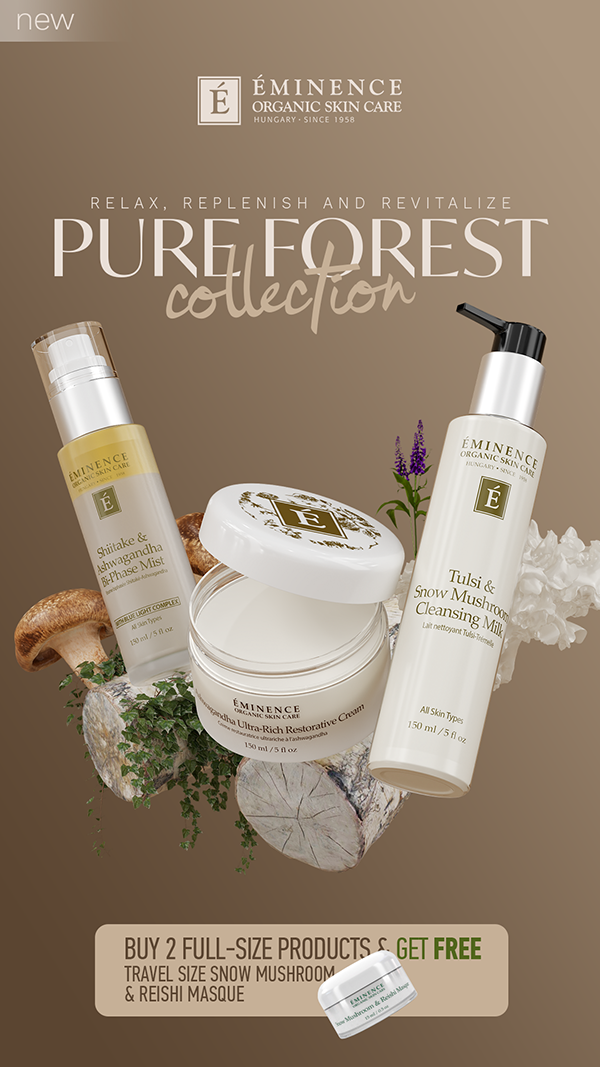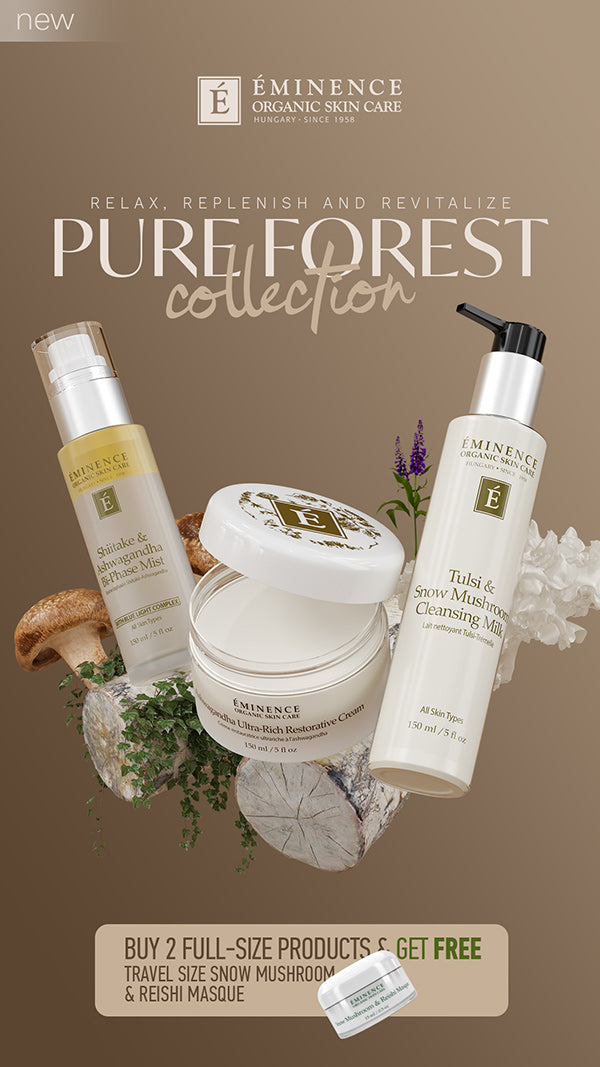-
Eminence Organics Coconut Age Corrective MoisturizerWith each application of the Eminence Coconut Age Corrective Moisturizer, you’ll feel your skin instantly tighten and lift. Coconut, shea butter and grape seed oil combine with green apple stem cell technology that offers lasting age correction. Retail Size: 2 oz / 60 ml...
- $69.00
- $69.00
- Unit price
- per
-
Eminence Organics Bamboo Firming FluidBamboo and coconut deeply hydrates and tightens skin with the help of a Natural Retinol Alternative and Swiss Green Apple Stem Cells. Retail Size: 1.2 oz / 35 ml The Eminence Bamboo Firming Fluid features a potent formula of proteins, antioxidants, vitamins and minerals to...
- $69.00
- $69.00
- Unit price
- per
-
Eminence Organics Monoi Age Corrective Exfoliating CleanserWash away impurities, remove surface debris and experience smooth skin like never before with this multi-action, exfoliating cleanser infused with exotic monoi. Retail Size: 8.4 oz / 250 ml Results: Skin is perfectly cleansed and polished Skin is primed for maximum absorption of subsequent products...
- $48.00
- $48.00
- Unit price
- per
-
Eminence Organics Neroli Age Corrective Hydrating MistA collagen boosting toner with Natural Retinol Alternative and Swiss Green Apple Stem Cells for all skin types, especially mature. Your skin will feel smoother and appear tighter with the energizing boost of the fragrant Eminence Neroli Age Corrective Hydrating Mist. Retail Size: 4.2...
- $39.00
- $39.00
- Unit price
- per
-
Eminence Organics Neroli Age Corrective Eye SerumPotent eye serum with Natural Retinol Alternative and Swiss Green Apple Stem Cells. Nourish and hydrate the look of the delicate skin around your eyes. Neroli oil, coconut water and green apple stem cell technology fight the visible signs of aging, including the appearance...
- $67.00
- $67.00
- Unit price
- per
-
Eminence Organics Bakuchiol + Niacinamide MoisturizerReplenish your skin's innate hydration levels using our gel cream moisturizer, skillfully crafted with the exclusive blend of bakuchiol, a gentle retinol alternative, and niacinamide. This dynamic duo effortlessly erases wrinkles, visibly firms your skin, diminishes the appearance of enlarged pores, and evens out...
- $69.00
- $69.00
- Unit price
- per
-
Eminence Organics Coconut Firming Body LotionRejuvenating and lasting hydration that dramatically improves skin tone and firmness. This tropical lotion contains an all-natural retinol alternative proven to increase collagen production by 25%. Coconut, shea butter and grape seed oil will leave your skin looking tight and firm, while providing deep...
- $42.00
- $42.00
- Unit price
- per
-
Eminence Organics Age Corrective Starter SetCleanse, treat, revitalize and moisturize to correct the appearance of aging with powerful ingredients formulated to create an ageless look with the complete Eminence Age Corrective Starter Set. A luscious combination of bamboo, monoi, coconut and neroli infuse the skin with nourishing properties while...
- $79.00
- $79.00
- Unit price
- per
-
Eminence Organics Bamboo Age Corrective MasqueTreat the skin with this age repairing mask that uses the most powerful anti-aging technology in natural and organic skincare. Retail Size: 2 oz / 60 ml Treat your skin to the Eminence Bamboo Age Corrective Masque, which uses the most powerful anti-aging technology...
- $65.00
- $65.00
- Unit price
- per
-
Eminence Organics Radiant Protection SPF Fluid - SPF30Shield your skin from the sun's unforgiving rays while effortlessly diminishing the appearance of fine lines and wrinkles. This SPF solution not only provides broad-spectrum SPF 30 protection for combination to dry skin but also imparts a luxurious, hydrating sensation with a radiant, dewy...
- $58.00
- $58.00
- Unit price
- per
-
Eminence Bakuchiol + Niacinamide Moisturizer SampleSample for the Bakuchiol + Niacinamide Moisturizer Sample Replenish your skin's innate hydration levels using our gel cream moisturizer, skillfully crafted with the exclusive blend of bakuchiol (a gentle retinol alternative) and niacinamide.
- $4.00
- $4.00
- Unit price
- per
-
Sparkle In Your Eye BundleRepair, hydrate, nourish, and SPARKLE with this blend of eye care products that we have bundled together to enhance your delicate eye area and keep you radiant. Eminence Organics Bearberry Eye Repair Cream: Ultra-hydrating eye cream with bioactive ingredients to hydrate and nourish the...
- $191.25
$225.00- $191.25
- Unit price
- per
-
Eminence Pamper Yourself Pretty BundlePamper yourself pretty with this purifying bundle. We are adding the Bamboo Firming Fluid to the Pure Forest Collection for a more intensive facial treatment. Eminence Birch Water Essence - Purify, detoxify and resort your skin’s moisture levels with this lightweight toner Eminence Snow Mushroom Reishi...
- $225.60
$282.00- $225.60
- Unit price
- per
-
IMAGE Ageless Total Eye Lift CremeThe IMAGE Skincare AGELESS Total Eye Lift Creme is a renewing eye cream that targets signs of aging. It is blended with glycolic acid and vitamin A to reduce the appearance of fine lines, undereye bags, and puffiness. This eye cream meets the clean...
- $62.00
- $62.00
- Unit price
- per
-
PCA Skin Intensive Age Refining Treatment (0.5% retinol)PCA Intensive Age Refining Treatment, the ultimate nighttime treatment for aging skin. With retinol, peptides, and stem cells, this powerful formula helps reduce fine lines and wrinkles, firm the skin, and even out skin tone. Plus, it's gentle enough for nightly use without irritating....
- $118.00
- $118.00
- Unit price
- per
-
Phytomer Expertise Age Contour Intense Youth Eye CreamConquer crow’s feet and cellular fatigue with this youth-enhancing eye cream, powered by marine criste, calliblepharis ciliate, and Oligomer® complex to protect the skin from premature aging. The Phytomer Expertise Age Contour Intense Youth Eye Cream is a results-oriented treatment that targets delicate and...
- $99.00
- $99.00
- Unit price
- per
-
IMAGE Ageless Total Repair CremeIMAGE Skincare AGELESS Total Repair Creme is a rich nighttime repair crème that combats the appearance of multiple signs of aging. A dual resurfacing system featuring glycolic acid and time-released encapsulated retinol help fight the appearance of wrinkles and uneven skin texture and tone....
- $88.00
- $88.00
- Unit price
- per
-
IMAGE Ageless+ Retinol Liquid 0.3% SampleFormulated with a standard dose of 0.3% pure liquid retinol, proprietary XOSM™ Technology and nourishing botanicals, this serum delivers visible improvement in in the appearance of fine lines & wrinkles, pores, radiance, pigmentation and skin firmness. Formulated for acclimated retinol users or combination/oily skin...
- $5.00
- $5.00
- Unit price
- per
-
PCA Skin Perfecting Neck & DecolleteDon't let those telltale signs of aging take over your neck and chest! The PCA perfecting neck & decollete treatment is here to help. This formula firm and tightens tissue with a unique blend of peptides and natural ingredients while preventing future wrinkles from...
- $90.00
- $90.00
- Unit price
- per
-
IMAGE Ageless Total Overnight Retinol MasqueThe IMAGE Skincare AGELESS Total Overnight Retinol Masque is a potent treatment formulated with time-released retinol technology to minimize the visible signs of aging and improve uneven texture and tone. The unique delivery system helps to maintain ingredient potency while ensuring gentler activation of...
- $86.00
- $86.00
- Unit price
- per
Trending Now
Popular Products
Eminence Organics Coconut Age Corrective Moisturizer
230 reviews
With each application of the Eminence Coconut Age Corrective Moisturizer, you’ll feel your skin instantly tighten and lift. Coconut, shea butter and grape seed oil combine with green apple stem cell technology that offers lasting age correction. Retail Size: 2 oz / 60 ml...
- $69.00
- $69.00
- Unit price
- / per
Eminence Organics Monoi Age Corrective Night Cream for Face & Neck
135 reviews
Nourish and replenish your skin’s appearance overnight with this deeply hydrating cream. The wonderful scent of monoi and an exclusive Anti-Aging Stem Cell Complex leaves the skin appearing finer, smoother and more youthful. Retail Size: 2 oz / 60 ml Results: Skin appears firm Appearance...
- $77.00
- $77.00
- Unit price
- / per
Eminence Organics Bamboo Firming Fluid
159 reviews
Bamboo and coconut deeply hydrates and tightens skin with the help of a Natural Retinol Alternative and Swiss Green Apple Stem Cells. Retail Size: 1.2 oz / 35 ml The Eminence Bamboo Firming Fluid features a potent formula of proteins, antioxidants, vitamins and minerals to...
- $69.00
- $69.00
- Unit price
- / per
Eminence Organics Mangosteen Daily Resurfacing Cleanser
120 reviews
Extend the benefits of a treatment or peel at home with a resurfacing cleanser. This milky gel lightly lathers to slough off dead skin without manual exfoliation or over-stripping. The Lactic Acid Complex and mangosteen in this cleanser work together to restore a smooth,...
- $48.00
- $48.00
- Unit price
- / per
Retinol and Alternatives
Sidebar
- Choosing a selection results in a full page refresh.




























